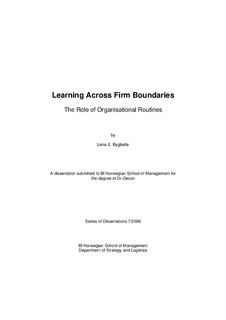| dc.description.abstract | The main purpose of the study is to contribute to the understanding of learning across firm boundaries. Such learning has often been associated with so-called knowledge-intensive firms engaged in learning alliances in order to develop new products and technology. In this study, on the other hand, I look at learning in ongoing relationships between customers and suppliers in industrial settings. I argue that these relationships entail just as much learning as relationships set up with more explicit learning objectives. However, this type of learning is as yet unspecified in the literature.
Building upon an adaptive perspective of organisational learning and an industrial network approach to business relationships, I address the topic by linking learning and relationships through the means of routines. Routines embed interaction between two relationship parties, co-ordinating the use and combination of resources involved in the relationship. When the parties interact through engaging in various routines, new experiences are gained, providing possibilities for learning and changes in routines and resource interfaces. As such a main role of routines in relationships is that they not only store existing knowledge but provide further possibilities for learning as well. An important dimension of routines is that they intersect, not only within a relationship but also between relationships. This implies that learning resulting in changes in one routine may propagate, leaving imprints beyond the original learning location.
A single, qualitative case study with three sub-cases is used to investigate learning in business relationships in this thesis. The empirical study concerns one focal customer company and three of its supplier relationships. Combining the insights from the two theoretical perspectives referred to above forms the basis for analysing learning in these relationships. Learning is here related to changes in the inter-organisational routines embedded in the relationships.
In summary, the findings from the study illustrate how and why routines may be used as a tool in order to investigate and understand important aspects of learning in ongoing business relationships in industrial settings. Furthermore, they illustrate how learning is reflected in such relationships when routines are in focus. Finally, the findings show the importance of considering and taking into account implications of learning beyond its obvious scope. Together these findings contribute to fill the gap in the theory, offering an extended understanding of learning in ongoing business relationships. | en |
